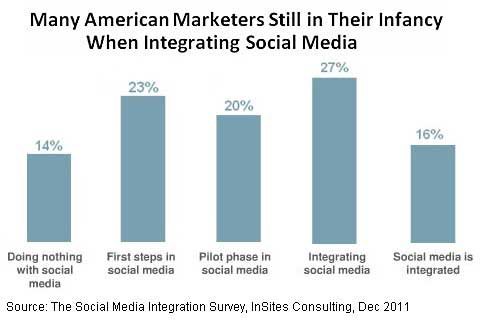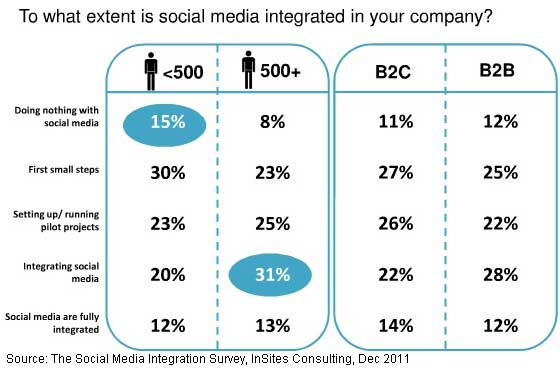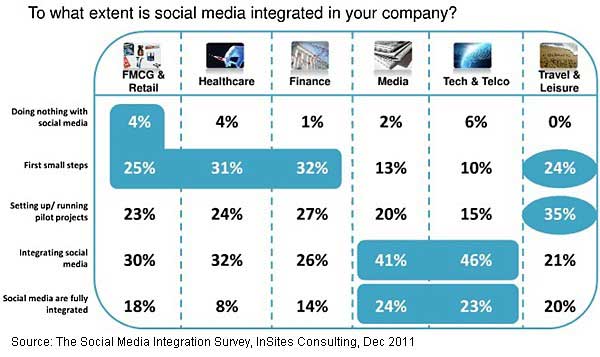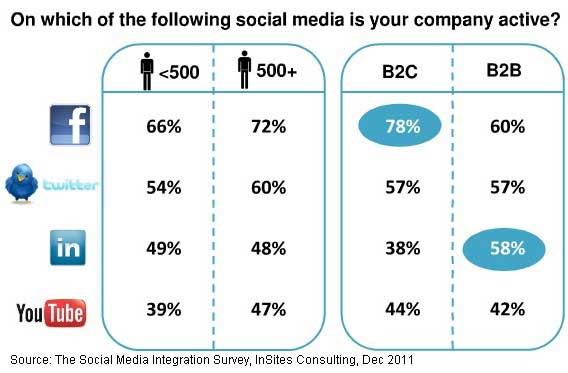Although most US companies use social networks—66% have a Facebook page, 51% have a Twitter account, and 44% have a LinkedIn page—only 16% say their social marketing efforts are fully integrated across the organization, according to [pdf] a study by InSites Consulting.
More than one-quarter (27%) of companies are working to integrate social media into their businesses; most, however, say their social marketing efforts are still in the early stages, with marketers taking first steps in implementing social media (23%) or piloting social media (20%).

Fully integrating social media into the organization positively affects companies in three key areas, InSites finds: 1) More effective marketing communications; 2) higher customer satisfaction; and 3) stronger financial returns.
By approaching social media tactically, rather than as part of an overall integrated strategy, companies are missing opportunities for better business outcomes, according the study.
Below, additional findings from the Social Media Integration Survey, among 400 US and UK companies, conducted by InSites Consulting.
Larger Companies More Integrated
In the US and UK, social media activities are only slightly less integrated in smaller companies (less than 500 employees) than larger firms (500+ employees) (12% vs. 13%), but fewer smaller firms are now working to integrate social media activities across the organization (20% vs. 31%).

Among B2B and B2C companies, there is nearly no difference in social media integration.
Tech, Media Sectors Lead in Social Integration
Tech and media companies lead the pack in social media integration: 23% of tech/telecom companies and 24% of media companies say social media is integrated across the organization. Another 46% of tech/telecom companies are working to integrate social media, as are 41% of media companies.

By contrast, companies in the financial and health industries are lagging behind in social media integration: Only 14% and 8%, respectively, say their social media efforts are integrated across the organization.
Barriers to Social Media Integration
Three types of change are needed to integrate social media into the organization, according to the research: 1) Personal change; 2) structural change; and 3) cultural change.Various factors impact people's attitudes toward such change.
Regarding personal change, for example, most companies say employees are open to new technologies, but few have formal social media training programs.
Among such "personal-change" factors, companies report the prevalence of the following (i.e., they fully agree or somewhat agree) within their organizations:
- Employees are open to new technologies and social media: 66%
- Company is trying to educate employees on social media: 41%
- Company is investing in technologies to facilitate use of social media: 41%
- Top management is active in social media: 40%
- Company has official training programs for social media: 29%
- Company thinks all employees should have social media training: 26%
Other factors impact structural change. Though most (58%) companies are using social media for better marketing results, only 38% say their company has a clear view on how to use various social media channels.
Among such "structural-change" factors, companies report the prevalence of the following (i.e., they fully agree or somewhat agree) within their organizations:
- Social media is being integrated into existing marketing plans: 67%
- Company is using social media for better marketing results: 58%
- Company has a person or team dedicated to social marketing: 57%
- Social media responsibility is clearly understood: 57%
- Company is working in cross-functional teams: 55%
- Employees are allowed to use social media during the work day: 43%
- Company has a clear social media policy in place: 38%
- Company has a clear view on how to use various social platforms: 38%
Similarly, various factors impact cultural change; among them, marketers report the prevalence of the following (i.e., they fully agree or somewhat agree) within their organizations:
- Corporate values are clearly defined: 63%
- Company lives up to its values: 53%
- Culture and strategy equally important: 53%
- Company has no social media policies; uses general code of conduct: 49%
- Company is actively re-defining company values: 43%
- Culture is tangible in everything company does: 42%
- All employees know the company values by heart: 39%
- Social media is high on priority list: 38%
The main barrier to change is the unclear financial return, according to the study.
Among surveyed companies, leads are the most important performance indicator (52%), followed by volume in online reach (46%).
Social Networking Stats: B2B and B2C Comparisons
Among companies in the UK and US:
- Twitter is equally popular among B2B and B2C, at 57% penetration
- Facebook use is higher among B2C companies: 78% use it, compared with 60% of B2B firms.
- LinkedIn is more popular among B2B firms: 58% use it, compared with 38% of B2C companies.

Larger companies use most social platforms at slightly higher rates than smaller companies. LinkedIn is the one exception, where adoption is slight higher among smaller companies (49%) than large ones.
About the data: Findings from the Social Media Integration Study are based on a survey 400 UK and US firms conducted in June 2011. The report is authored by Steven Van Belleghem, managing partner of InSites Consulting and marketing professor at the Vlerick Management School, in Gent, Belgium.



